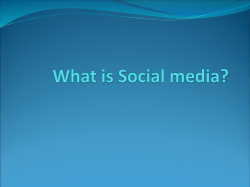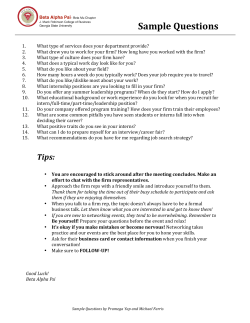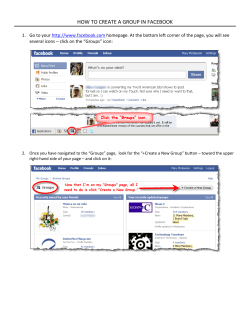
Document 185157
WenatcheeHOMEFINDER’S Valley BusinessGUIDE World | August 2011 10 GUEST COLUMN How to adopt a social media policy Q uestion: “I run a small advertising agency with about 10 employees. Given the nature of our work, our employees spend much of their time online, especially on the social media websites including Facebook, Twitter and LinkedIn. We have found these websites a tremendous source of revenue, as all of our clients are looking to develop advertising strategies for these sites. “So it came as a shock when I looked at an employee’s Facebook page — she had posted pictures of her new baby and I wanted to congrather — and saw By Cliff Ennico ulate Business to several of her postings saying what an imposBusiness sible boss I was. In one posting, I was described as a ‘witch’ and how unreasonable my demands on her time were in light of her new baby. She also went on to describe, in considerable detail, some of the projects that she was working on in our office, including some information that I felt was confidential to our client. “In looking further into this, I learned that at least some of these postings were made from one of our office computers, during the workday when this employee should have been working on client projects. Needless to say, I am furious about this and want to bring it up with my employee. But I want to make sure that I am on solid legal grounds before I do anything. Any thoughts?” Answer: Congratulations! You have stumbled into probably THE hottest issue in labor and employment law right now. As you correctly point out, the proliferation of social media websites, such as Facebook, are a double-edged sword: They are a great way to obtain information about someone easily and at low cost, but they create huge opportunities for abuse both by employers and employees. It is tempting, EXTREMELY tempting, to discipline this employee for her online remarks, which clearly are not consistent with the “duty of loyalty” any employee owes to her employer. But before you take any action, you need to talk to an employment law specialist, as the (extremely few) courts that have addressed this problem have taken the employee’s side. A number of state and federal laws prohibit employers from monitoring their employees’ online behavior and/or making use of information obtained from that monitoring to discipline employees. For example: • The federal National Labor Relations Act affords both non-union and unionized employees the right to engage in protected “concerted activity,” which includes the right to criticize their employers and to discuss their discontents with co-workers and outsiders. • Federal and state “whistle-blower” laws may protect employees who complain about working conditions affecting public health and safety or violating federal antifraud laws. • Federal privacy protections may extend to Facebook postings made from your employee’s personal computer or e-mail account (as opposed from the employer’s computer or e-mail account, which is a ‘gray area’ in the law right now). • Many states prohibit employers from regulating employee political activities and affiliations or influencing employees’ political activities. • At least four states (California, Colorado, North Dakota and New York) prohibit employers from taking adverse employment action against an employee or applicant based on legal off-duty activities. For example, an individual over 21 years of age who posts pictures of himself intoxicated at a party, and sometimes illegal off-duty activities — the same individual smoking marijuana. In this case, there’s also the chance that any action against this employee will be viewed as discrimination against her because of her “new mom” status. The right way to proceed here is for your agency to adopt a “social media policy.” Circulate it to all your employees and then schedule an “all hands” meeting to review the policy. Provide specific examples of prohibited behavior, at which you will state clearly that employees should review all of their social media pages and “scrub” any improper information — especially any information about a particular client project, which could expose your agency to legal liability. Your social media policy should: • Warn employees that they will be disciplined, and possibly fired, if they post proprietary and confidential company or client information, or make discriminatory or defamatory statements or sexual innuendos about the agency, co-workers, management, customers or vendors. Sorry, but the “witch” comment probably won’t be enough. • Advise employees that any blogs or social media postings must include a disclaimer that “any opinions expressed are the employee’s own and do not represent the company’s positions, strategies or opinions.” • Remind employees to conduct themselves professionally both on and off duty. As federal and state laws are “all over the place” on this issue right now, I would recommend you hire an employment law specialist to draft your policy (and perhaps also sit in on the employee meeting). Most attorneys will charge between $1,000 and $2,000 for this service, and it’s well worth the expense. Cliff Ennico (crennico@gmail.com) is a syndicated columnist, author and former host of the PBS television series “Money Hunt.” GUEST COLUMN Trust is the foundation of networking N etworking — the art of connecting people with other people to meet a need. Sounds simple enough. But is it? There is a decided difference between networking and selling. Small business owners, managers and sales people are selling all the time to make a living. Let me give you an example of how networking can grow a business. I By Doug metRecently a person Morgan who is a credit Business counselor. She Networking helps people clean up their credit so they are credit-worthy for purchasing homes, cars and other things they need to buy on credit. I logged it in my memory bank that she might be able to help someone I would run into. The very next week, I did run into someone who had bad credit because of something that happened in their life before they were of legal age. Sounded to me that this person could use some credit counseling, so I gave the person in need the name and phone number of the credit counselor. I also asked her if it was OK to give the counselor her number as well. What happened here? One person had a need and the other could fill the need. I became the link to connect these two people. This is an example of networking at its best. I knew someone who could meet a need and a person with that need and put them together. Businesses are always in need of services from other businesses. If you can be the person of trust who can connect them, you have helped them both — and possibly yourself, if in the future they have a need you can fill. In other words, what goes around comes around. The foundation of networking is trust. If I know two people and they both trust me but don’t know each other, I can put them together because of the trust they have in me. The key here for future networking opportunities is the person who receives the referral has a very important obligation. If they take care of my referral, then three people win. The opposite is true if they don’t take care of my referral. To be a great networker, you must listen for a need, even if the person doesn’t come right out and ask you for a referral. You just listen for cues and then ask if they would like the name of someone you know and trust who could help them, such as in SAVE 25% * Tired of paying too much? On Your Fire Extinguisher Service *Must show last year’s invoice. New customers only. 663-3004 Fire Protection t'JSF&YUJOHVJTIFST t3FTUBVSBOU4VQQSFTTJPO4ZTUFNT the example of the person above needing help with their credit. By making this a natural part of your day, you become the “go-to” person that people will call whenever they have a need. Doug Morgan is Executive Director of BNI Central and SE Washington, LLC, along with his wife, Joyce. BNI is a worldwide business networking orgainzation. He is also a former newspaper publisher. He can be reached at morgans@bni.com or by calling 509-293-9694. His website is: http://www.bnicentralsewa. com Serving North Central Washington since 1946. Providing the highest quality legal support and services to businesses and individuals with more than 20 attorneys, JDSA is the largest law firm in NCW. MAJOR PRACTICE AREAS INCLUDE: Corporate, Business Law, Construction, Contracts, Employment Law, Complex Litigation, Estate Planning and Probate, Taxation, Real Estate, Land Use, Environmental, Agricultural, Healthcare and Municipal Law 2 6 0 0 C H E S T E R K I M M R O A D ◊ W E N AT C H E E 509.662.3685 www.JDSAlaw.com
© Copyright 2025





















